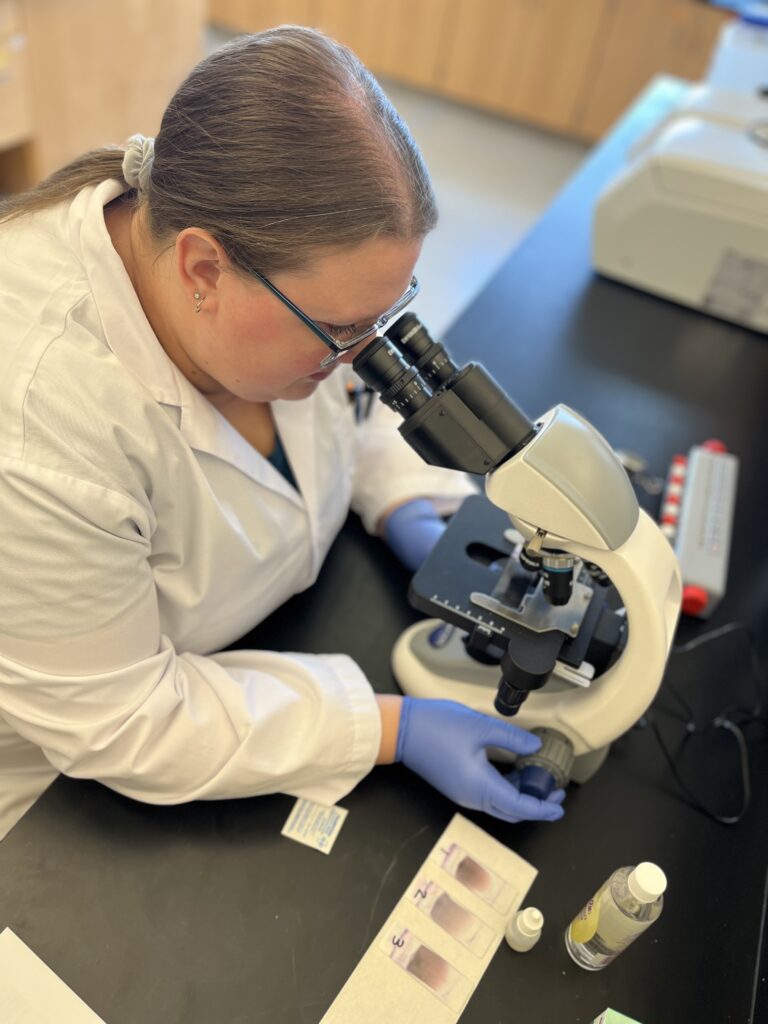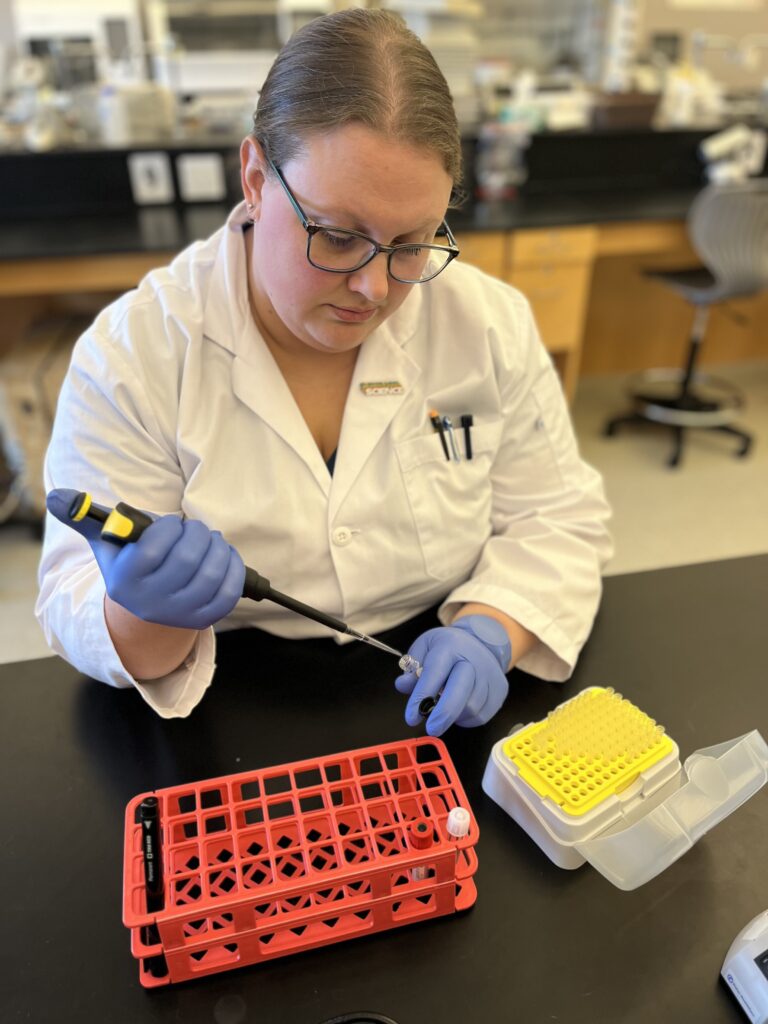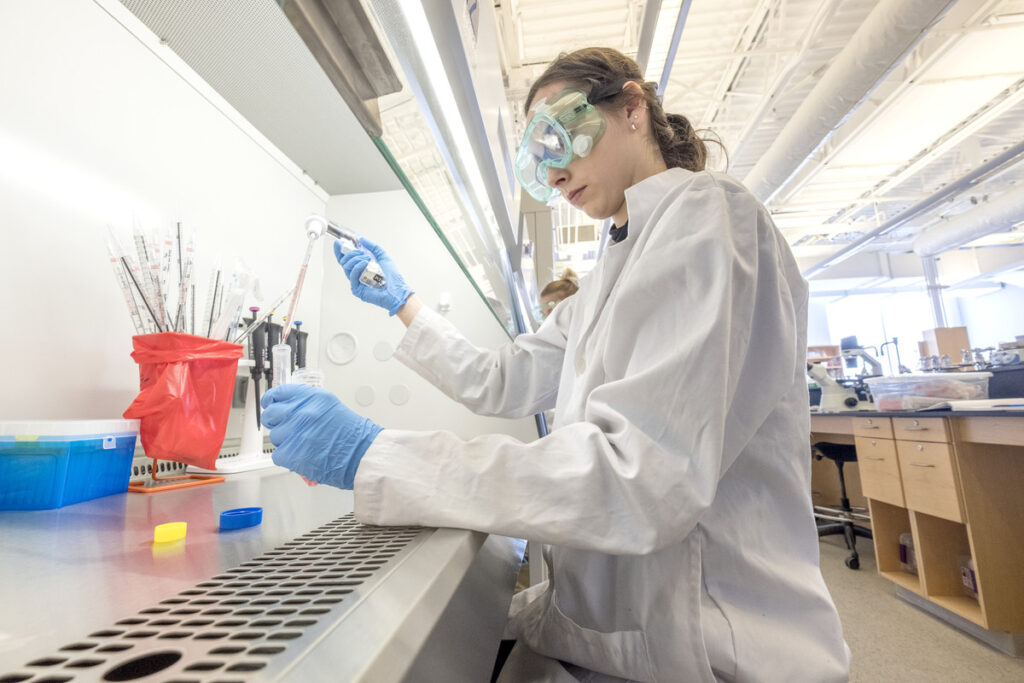Foster healthy communities as a medical lab professional
Jan. 10, 2025
Patient-focused health care is becoming a top priority in our communities as workforce shortages impact the labour market. Now more than ever, growing fields like medical laboratory technology are looking for people passionate about helping others and making a difference. If you love science, have great people skills and enjoy solving problems, consider preparing for a career as a Medical Laboratory Assistant or Medical Laboratory Technologist at Georgian.
Which program is best for you?
The Medical Laboratory Assistant (MLBA) program is a great starting point to explore pre-analysis tasks of medical lab work, while the Medical Laboratory Technology (MLBT) program offers a blend of classroom learning, high-tech laboratory activities and clinical placements.
Want the best of both worlds? Start your postsecondary journey in the MLBA program and get advanced standing in MLBT. Graduate job-ready with a combination of patient-centered skills and scientific knowledge.
| Medical Laboratory Assistant | Medical Laboratory Technology |
| Finish this program in one year and earn an Ontario College Certificate. | Complete this program in three years and earn an Ontario College Advanced Diploma. |
| Learn how to collect blood samples, perform ECGs, and use state-of-the-art laboratory equipment. | Analyze patient samples to support diagnostic decisions in a fast-paced environment, and develop scientific skills in clinical chemistry, microbiology, histology, hematology and transfusion science. |
| Practise communication skills and face-to-face interaction with patients. | Get two clinical placement experiences and apply your technical skills and knowledge with experienced professionals. |
| Take part in a supervised, structured internship and get hands on in a real medical laboratory setting. Plus, get a clinical placement at the end of your second semester. | Begin your career as a registered Medical Laboratory Technologist. Graduates will be eligible to write the National Registration Exam through the Canadian Society for Medical Laboratory Science (CSMLS). |
Going under the microscope – a student perspective
We spoke with Danielle Proulx, a current Medical Laboratory Technology student, to learn more about her Georgian experience.

Why did you decide to pursue medical lab technology as a career?
I’ve always had an interest in healthcare, but my career path initially took me down the community services route. Then 2020 happened and the job landscape totally changed because of the pandemic. Not knowing exactly what route I wanted to go, but knowing I wanted to be back in the science world, I completed a biotechnology diploma. Around the time I finished that (at Georgian) I knew I loved being in a lab but wanted to focus on human medicine. That happened to be exactly when Georgian announced their MLBA program, and I knew that it was the direction I wanted to go.
What has your experience been like so far in the MLBA and MLBT programs?
These teachers are so passionate about the profession and giving us the best possible educational experience. They aren’t just teaching us the science but relating it to everyday work in a hospital lab with stories from their own careers. They all have extra resources and are always willing to help. The other amazing thing are the practical labs. Being able to be hands on with just about everything you’d do in an actual hospital lab is a game changer especially for someone like me that learns best by doing.
How was the transition between MLBA to MLBT, and why did you decide to take both programs?
When I took the MLBA program MLBT didn’t yet exist at Georgian so it was the only path to take. That said, being partway through MLBT now and looking back I would have done it the exact same way. Being able to do a student placement in a hospital lab at the end of MLBA and see what assistants and techs were doing really helped cement my decision that I wanted to continue. Not only that but at the end of my student placement I was able to secure a job as a medical lab assistant at my local hospital. Now as I continue my education, I get to see what I’m learning put in practice firsthand.

What skills/knowledge have you gained and how has this prepared you for your career? Do you think taking both programs will help give you an advantage in the workforce?
The biggest skill I’ve gained is adaptability and flexibility. Sometimes things just don’t go right, a machine breaks down, a test is giving inconsistent results, or a sample isn’t as good as you wish it was. Humans aren’t simple or perfect so when working with people and their health, answers aren’t always simple or perfect either. Sometimes there’s a puzzle to solve, and I feel like I’m learning multiple ways to keep calm and get through solving it. I also believe knowing both MLA and MLT roles is a huge advantage in the workplace. Assistants and techs are working side by side, and by knowing the pressures and expectations each role faces, it helps build a strong symbiotic working relationship.
Would you recommend MLBA/MLBT to future students looking for a pathway into healthcare?
I would absolutely recommend MLBA/MLBT to students looking to get into healthcare. It’s a lot of work, there’s a lot to learn, but it’s incredibly rewarding to be able to do my part is helping patients through their hospital stay.
Top reasons to become a medical lab technologist/assistant

- Engage with patients. You’re often the first point of contact in a hospital or lab setting. If you love helping people, you’ll get to do that every day with a career in the medical lab field.
- Have a rewarding career in an in-demand field. According to the Canadian Occupational Projection System, there will be over 25,000 job openings for new MLA/MLTs through 2031 due to recent labour shortages and an increased demand to meet health-care needs of a growing population.
- Channel your inner detective. You might not work the same cases as Sherlock Holmes, but analyzing specimens comes with a lot of problem solving. Often, you’ll have to do some exploring to find the right answer.
- Get hands-on experience with state-of-the-art equipment. Love working with your hands? In this profession, you’ll be kept busy drawing blood samples and operating sophisticated equipment on the daily.
- Use your passion for science to make a difference. Medical lab tests and diagnoses are critical in detecting illnesses and diseases. With your help, people get the information they need quickly to stay healthy.